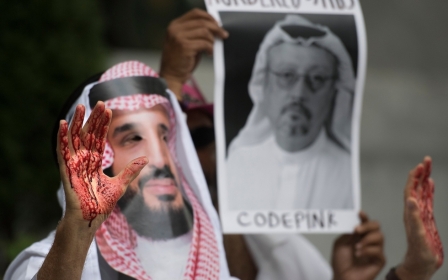Israeli press review: Right-wing politicians jostle in war of words
Lieberman threatens Gaza strikes – but is it grandstanding?
Israeli Defence Minister Avigdor Lieberman’s recent calls to launch painful military strikes against the Gaza Strip should be understood as an effort to reassert his hard-right credentials, military correspondent Yaniv Kubovitch writes in Haaretz.
“We must land a strong blow against Hamas. That's the only way to lower the level of violence to zero or close to zero,” Lieberman remarked this week, in a departure from the more measured tones he has struck in recent weeks.
With Israeli citizens casting ballots for city councils at the end of October, and a national election season looming in the year that follows, Lieberman’s pronouncements sound a lot like political grandstanding, says Kubovitch.
According to the Haaretz writer, the defence minister’s threats create the impression that the Netanyahu government would adopt his bellicose proposals, if not for IDF chief of staff, Gadi Eisenkot, and other top army officials, who are urging restraint at present.
Whose more right-wing?
The leader of an opposition party called for the homes of Hamas leaders to be destroyed, and pointedly noted that his position regarding the Gaza Strip is further to the right than that of the right-wing Israeli government, Hebrew news site Kikar Shabbat reports.
Yair Lapid, whose Yesh Atid faction was the largest party in the previous Israeli parliament, made his remarks in the southern city of Beersheba, outside the ruins of a home destroyed this week by a rocket launched from the besieged Palestinian enclave.
“That’s what the house of [Hamas leader] Ismail Haniyeh should have looked this morning,” Lapid said. “On this issue, I am further to the right than the government. I repeat: look at this house, and ask yourself why the house of Yahya Sinwar doesn’t look like this, this morning.”
Rage over election posters in Ramle
Posters paid for by the Jewish Home party have been removed in the central Israeli city of Ramle after residents outraged at the racist message they contained plastered over some and destroyed others, Israeli daily Haaretz reports.
The large posters, intended to convince locals to vote for the far-right Jewish Home party in upcoming municipal elections, played upon fears of Palestinian citizens of Israel in general, and romantic relations between Arabs and Jews more specifically.
“There are hundreds of incidences of miscegenation in Ramle. And no one cares. Tomorrow, it could be YOUR DAUGHTER. Only a STRONG Jewish Home can preserve Ramle as Jewish,” read the posters, which featured an image of a young woman wearing the hijab.
Angered by the campaign, anti-racist artists and activists took to city streets and covered the signs with posters that pilloried their messaging, stating: “Only a hard struggle will eject the racists from the government.”
Not Jewish enough
Advertisements attacking a far-right party’s candidate for the Jerusalem city council as insufficiently pious were revealed to be the work of a current member of the body who is considered even further to the right.
Jerusalem councillor Aryeh King was exposed as the sponsor behind the nine-month-old adverts slamming Hagit Moshe, chair of the Jewish Home party’s campaign for city council, Srugim disclosed on Wednesday.
“This is how the representative of the ‘knitted skullcaps’ walks around in the holy city. REMOVE THE SKULLCAP,” read the signs, which featured photographs of Moshe, dressed modestly but without all of her hair covered. “Knitted skullcaps” is an Israeli slang term for the country’s national-religious political camp.
“This is how the representative of the ‘knitted skullcaps’ embraces in the holy city,” read another of the campaign signs, which included images of Moshe standing near a number of male politicians, including Jerusalem Mayor Nir Barkat.
New MEE newsletter: Jerusalem Dispatch
Sign up to get the latest insights and analysis on Israel-Palestine, alongside Turkey Unpacked and other MEE newsletters
Middle East Eye delivers independent and unrivalled coverage and analysis of the Middle East, North Africa and beyond. To learn more about republishing this content and the associated fees, please fill out this form. More about MEE can be found here.




